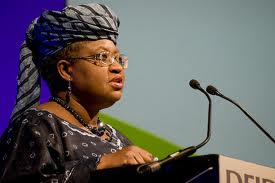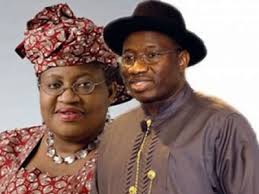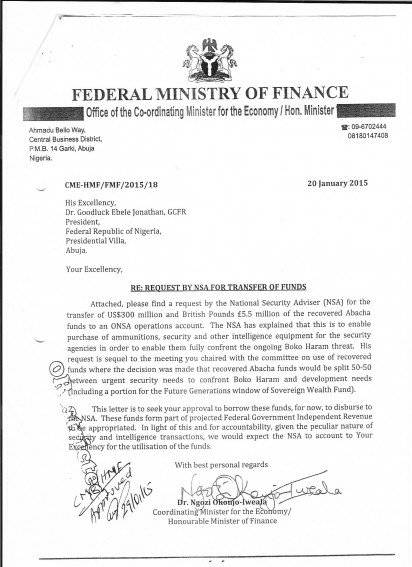Don’t Trivialise Corruption, Tackle It – Dr. Ngozi Okonjo-Iweala at TEDxEuston
Below is the transcript of the address of the Honourable Minister of Finance and Coordinating Minister of the Economy, Dr. Ngozi Okonjo-Iweala, at the TEDxEuston:
Before I start I think I’m going to ask for something. I don’t know if it can be done, can we have some music? These horns – can somebody make them work?
Let me tell you what I will like just before we get started. Chikwe did a very moving tribute to Madiba, and we all sat in silence and listened; I have been very honoured to meet him three times personally and twice we have actually had a conversation. All sorts of things have been said about his seeing different activities and different sectors and different events and different attributes which are used to build peace and reconciliation and build a nation.
But there is one thing that he also used powerfully, that is music – and the people of South Africa understand that, they also understand that a great man has passed. In almost all his photographs, he was dancing somewhere, so let us get up and dance to honour Madiba – and the music has to be good.
Mandela is gone, long live Mandela.
Most of you know me and usually listen to me talk about a new Africa, a rising Africa and a hopeful Africa, that’s usually the kind of topic I try to talk about with our young people. Precisely because of what Chikwe said that we are fed a diet of negativity about ourselves these days, and we must not allow that to stand.
But I also think that it is not difficult to talk to mature people about issues that confront them. So today, I’m going to depart a little bit from my talks on Africa, because I have a lot of young Africans and her lovers here.
I want to talk about a difficult topic, that topic is talked about by non-Africans and even more frequently by Africans themselves, and it has gotten so critical that when you mention the name Africa or even the name of my country Nigeria, the word ‘corruption’ rings isn’t it? I want to talk about corruption today, it’s a difficult topic, it’s a sensitive topic, but I think we are mature enough to talk about it.
As the continent does better, as we have Africa rising and growing; we also struggle with issues of creating jobs. We have a long way to go, we are talking about growth, but we really need to grow faster to be able to make an appreciable dent on poverty.
We need to create jobs and include those at the bottom of the ladder. We are struggling with so many problems; governance and issues on corruption are also inclusive. We need to highlight some of the root causes and have sensible conversation on these also.
So, I am speaking for my continent, my country, and even for other countries globally. We have to admit that in most cases corruption is the problem. Corruption is not tagged to a particular set of people, whether in the UK, US, Nigeria, or other African countries. It exists in one form or the other and the issue is the set of laws and the will we have to fight it.
Speaking for my country, we have to say, “Yes, we have problems”. Corruption undermines development in Nigeria and the continent at large. It deprives us of resources with which we can fight poverty and create wealth for people.
When a civil servant demands under-the-table money for a service that they should deliver, they diminish the service and the people they serve; this is corruption. When a teacher demands sexual favours to give students high marks in an examination or to pass them, they diminish the students, they diminish themselves, they undermine education; they undermine development – this is corruption.
When a public servant diverts resources from the state budget or national budget and siphons them abroad, removes them from doing the work and any good for the people. This is corruption on the part of the person embezzling public fund at home and also those receiving it abroad.
When people steal our mineral wealth, be it crude oil or other natural resources in any of our countries on the continent and they divert and send it abroad; that is corruption on the part of those stealing and receiving. When a company illegally refuses to pay tax and finds clever ways to take out the profits and resources which they ought to pay in the country they are working, this is also corruption.
It is also corruption for a business man to support a politician in return for inordinate access to contracts or resources. All of these undermine development and the very fabric of our society.
But there is one thing I think is very important and that is what I call the ‘trivialisation of corruption’. What do I mean by that?
Trivialising corruption is going on mightily in some of our countries right now. You trivialise corruption when there is evidence that an act or a policy is legitimate and yet for your own purpose, either political or otherwise, you label it as corruption. When people divert attention from the real issues and focus on issues that are not relevant, that is a way of trivialising corruption. You trivialise corruption when you use it as a weapon to castigate other people; whereas the evidence is there.
Let me give you an example, you all saw Chikwe put up a whole series of newspapers with their negative reports, that doesn’t mean all newspapers are bad. Some newspapers are good, some reporters and journalists are good. I had an example recently of this trivialisation from one of our national newspapers ‘The Punch newspaper’; they claimed that a government policy where we give incentives to industries or business people to spur them to invest in the economy was a bunch of corruption.
Yes, in the past it wasn’t a good policy, we had people who came and got particular incentives to spur their businesses and it gave them an undue advantage over others. We call them waivers and exemptions. They will get an advantage and their businesses will get an advantage because they had a particular exemption to give them an incentive to do their job.
So two years ago, we looked at this and in the economic management team in Nigeria the president totally agreed that this doesn’t work very well, and it gives an undue advantage, creates an unequal playing field. We decided that we will reform it, so that we can decide: what are the sources of growth, which sectors are likely to help the economy the most? And then we will grant these exemptions and incentives within those sectors. The key is that anybody working with this sector is entitled to get this exemption. So we reformed and it is still in the process of strengthening and reforming. It is not perfect, but it has come a long way, now this is a whole new sectoral policy.
So, when the newspaper wrote an editorial and said this was corruption. We pointed out that, “Yes, in the past, it wasn’t good but now we have been running a different system for two years.” They dared us to publish those who got these waivers; and guess what? Last week we sent it to them; yes we did. But you know what? They refused to even look at it. And they continued to insist that this was excess bite of corruption.
Why am I telling this story? It is because if you spend enough time trivialising an issue when the evidence is in front of you, then you are not doing a good service. So, let those who want to know more about that visit the budget website or even go on the internet and they will see this publication. I have spent some time on this story, because I think we need to be mindful ourselves not to divert attention from the serious issue which we have to deal with and spend our time on the trivialisation of what is truly an important issue.
Now, I want to delve into one more aspect which is also an important issue. That is an aspect of one of the underlying sources or roots of corruption, which we don’t usually talk about very much. I want the young people on the continent to truly think about it, it is about how we finance our democracy and finance our elections. We all want democracy in our countries; we have worked very hard on the continent to have this. So many countries now practice multi-party democracy; we now conduct elections. It’s the only form of governance that can allow a voice for the people.
Have you ever thought of how elections are financed? No country has been able to crack this problem. In the US they have conversation about campaign finance and they’ve tried to reform it; they’ve got a system, but I’m sure they will admit it’s not perfect; even in the UK and so many other countries. But at least they are having a conversation about it, isn’t it? And they are talking about what to do to make it better.
In the continent of Africa, how many of you have thought about this issue whether we are doing it right, has anyone even thought about this? To me one of the root causes of corruption in the continent is the way we finance or do not finance elections properly. We have adopted systems that demand that politicians’ campaign, haven’t we? Campaigns cost money. But where does that money come from?
If we don’t find a legitimate means of supporting campaigns, then all sorts of ways are found to do this. It could be, as I said before, engaging business people who support an individual, a system or a party and then later on, they have to be rewarded through contracts or other means that may actually not help but undermine the economy and development.
We haven’t found an answer to this problem but the silence in this room gives me concern. That’s why I want us to respond to it, because the next generation will have to think about it. It means we haven’t begun to have the kind of conversation we should have. If we don’t solve this problem, people will continue to find unorthodox means of financing their elections, of financing the implantation of democracy. And this very means may be the root of some of the corruption we do not want, which may totally affect the way we do business.
So, I want us to think about this, think about ways, and think about means; if we want democracy to continue to thrive in our continent, if we want to deal with some of the root causes of corruption. We also have to think of how we can finance that very good that we want. I want us to start a conversation about it. I’m sorry for starting your day with such a sober topic. But I think this is the right group and the right audience, isn’t it? I want us to start a conversation; what if we decide that we want a certain percentage of each of our countries’ revenue to be dedicated to this purpose and that people need not run around to look for means and stress themselves to finance political parties or election campaigns, but that it is a legitimate public good that we have said we want in each country we want democracy? Therefore we must find a legitimate way to support this.
What if we say we will do that, is that a way? What other ways can we think about? How can we have this conversation? How can we innovate? We’ve got so many young people on our continent with innovative ideas including all of you in the audience here.
Look at this TEDx, is this not creativity? Is it not innovation? If we can do a thing like this; if we can have ‘Ushahidi’ in Kenya which helped to track political violence and is now used in applications all the way in Haiti; if we can have this wonderful discovery that a young Ghanaian made that helps us detect fake drugs and saves life; if we can have the application on budget that a young Nigerian has put together that enables us understand our budget better – if we can have these and many more; if we can use technology to solve our problems; if we can think and put together knowledge that puts us ahead, why can’t Africa be a leader in thinking and innovating legitimate ways on how to finance election?
We want you to join this discussion, please visit innovatedemocracyafrica.org and share your ideas on how we can finance our democracy better; how we can root out a burdened source of corruption in our society and share any other ideas you have about how to solve the problem.
Let me end by saying this, we must take personal responsibility for these issues. Too often I see people think it’s them or someone else, or the government or that other person. On Twitter, I get lots of messages that say, “Why don’t you do this or why don’t you do that?”
Well you know what I said, the reason I came back to government was because I felt even if the environment is difficult and there is only one little thing I can do to plug a hole, solve a problem even if it’s small, it is meaningful. If there is one little thing you can do, don’t shy away. If you can come into government and help solve something, don’t think someone else is there to solve it for you.
If you can do it from civil society, and I mean legitimate civil society, not those who are saying they are civil society but are doing something else. If you can solve it as a civil society, if you can solve it from the media; if as a media person you can observe principles and say you are not for sale and tell the truth; if you can use this means to galvanise action, please do it.
It is you who have to take responsibility, I have to take responsibility. We can’t leave it to someone else, we have to take responsibility.
Thank you ladies and gentlemen.




